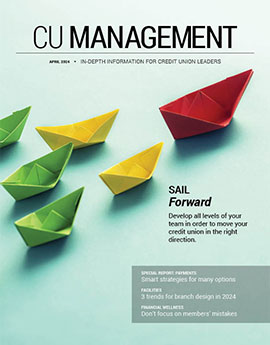2 minutes
To best serve members with emerging technology, think big picture and watch what retailers do
Much of the latest technology for personal financial management and shopping are meant to empower consumers, who view their financial lives holistically rather than as a collection of products and services. CUs that want to succeed should take the same holistic approach, says Nicole Adams Kraus, principal of Decision Strategies International, Conshohocken, Pa.
To track what’s possible, keep an eye on technology-based retailers like Amazon.com, suggests Ben Rogers, research director at Filene Research Institute, Madison, Wis. “It’s the retailers who are out in front. Financial institutions generally are following in their footsteps.”
Of course retailers have more incentive, Rogers adds, because they see a direct tie-in to more sales and higher revenue. Not having that direct sales tie-in could make CUs more trusted, but also expose them to building out their infrastructure without getting much return on their investment. Revenue is one of the biggest questions hanging over any CU’s strategic move into PFM, Rogers concedes. “It should improve member relations and retention, but it’s harder to monetize the benefits.”
Still it’s worth watching the marketplace. In the months ahead, keep a close eye on merchants and how they are positioning themselves in the payments area, Kraus advises. MasterCard and Visa are under attack from merchants who think the card companies charge too much and are investing in alternatives that could end-run traditional bank cards.
And pay attention to whatever Apple and Google do in the payments space, Kraus adds. “How it will affect CUs is still unclear, but the potential for disruption is certainly there,” she says.
By embracing changes in member-facing technology, it’s easy to add costs without adding comparable revenue or savings, notes Terence Roche, principal with Cornerstone Advisors Inc., Phoenix, a CUES Supplier member and strategic provider. What a CU does with technology has to tie into its financial strategy and reflect carefully directed spending, he says.
Whatever details remain unclear, the mobile revolution—and its continued impact on personal finance—is certain and permanent. CUs that hope to grow will have to embrace it, says Ron Shevlin, senior analyst at Aite Group (www.aitegroup.com), Boston. And that means more than letting members check their account balances on their smartphones or remotely deposit checks. It means providing personal financial management, such as budgeting, expense control and smart shopping, he explains.
Richard H. Gamble is a freelance writer based in Colorado.








